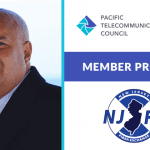 As the month opened, we digested what an anniversary meant: specifically, the 50th Anniversary of the first message sent on the ARPANET. The actual message was truncated to just two letters: L and O. Was “LO” in folklore heralding something wonderful? In fact, researchers admitted they were just trying to type LOGIN before the system crashed. Regardless, the two-letter transmission represents networking history, and one of the first waves of the digital age.
As the month opened, we digested what an anniversary meant: specifically, the 50th Anniversary of the first message sent on the ARPANET. The actual message was truncated to just two letters: L and O. Was “LO” in folklore heralding something wonderful? In fact, researchers admitted they were just trying to type LOGIN before the system crashed. Regardless, the two-letter transmission represents networking history, and one of the first waves of the digital age.
Fifty years later, another wave is upon us as 5G approaches. In November, experts considered why China is now so confident in the technology race, said by some to be a geopolitical battleground. In Egypt, the new wave was given more impetus as the WRC-19 intergovernmental meeting ended after agreeing to identify more spectrum for 5G and set new international rules for satellite megaconstellations.
The epicenter of these waves and this battleground is the Pacific Rim, increasingly the global high tech pacesetter. The World Bank said that five of the top ten places to do business are in the region.
But there are also many disparities and demands in these waves of the digital age. Extreme poverty means many people in the Asia-Pacific still “go to bed unfed,” so do we now need smart resource management? Will digital financial literacy in Asia be important? How do we improve prospects for Asia’s women and girls and future-proof Asia’s workforce to digital disruption?
There were some success stories: Asia-Pacific saw two top-performing service providers in the managed service space. In satellites, Kepler announced it had delivered the first Arctic high-bandwidth satellite service. Six years in the making, Kacific’s broadband satellite services will arrive in the Pacific in December. But dreams faded for one provider: LeoSat announced a business shutdown after investment ceased.
We saw new ideas on leadership in this critical time. Experts suggested 18 practices in six main elements are critical in making a CEO excellent. But how do we make leaders transparent and accountable? One Pacific telco asked if building more trust through open communication was a good business model too.
Pew Research Center said leading experts are “optimistic” about trends for the next 50 years of the network age. But there’s a caveat: this positive future will probably need more reforms, rights, and fairness. In 50 years, after so many waves of change from the digital era, it looks like the upcoming one will place responsibilities on just about everyone.




